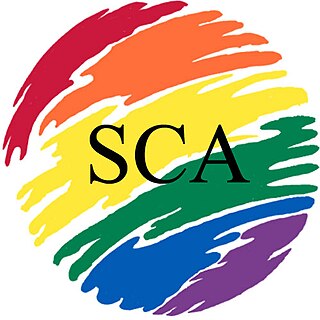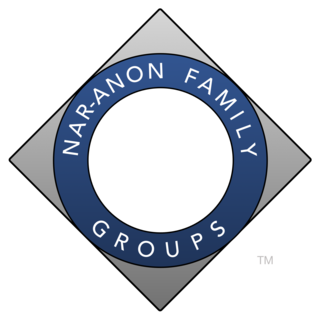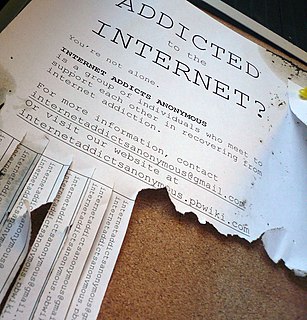
Alcoholics Anonymous (AA) is an international mutual aid fellowship with the stated purpose of enabling its members to "stay sober and help other alcoholics achieve sobriety." AA is nonprofessional, self-supporting, and apolitical. Its only membership requirement is a desire to stop drinking. The AA program of recovery is set forth in the Twelve Steps.
A twelve-step program is a set of guiding principles outlining a course of action for recovery from addiction, compulsion, or other behavioral problems. Originally proposed by Alcoholics Anonymous (AA) as a method of recovery from alcoholism, the Twelve Steps were first published in the 1939 book Alcoholics Anonymous: The Story of How More Than One Hundred Men Have Recovered from Alcoholism. The method was adapted and became the foundation of other twelve-step programs.

Narcotics Anonymous (NA) describes itself as a "nonprofit fellowship or society of men and women for whom drugs had become a major problem". Narcotics Anonymous uses a traditional 12-step model that has been expanded and developed for people with varied substance abuse issues and is the second-largest 12-step organization.

Sexaholics Anonymous (SA) is one of several twelve-step programs for compulsive sexual behavior based on the original twelve steps of Alcoholics Anonymous. SA takes its place among various twelve-step groups that seek recovery from sexual addiction: Sex Addicts Anonymous, Sex and Love Addicts Anonymous, Sexual Compulsives Anonymous and Sexual Recovery Anonymous. Collectively these groups are referred to as "S" groups since all their acronyms begin with that letter: SA, SAA, SLAA, SCA, SRA.

Cocaine Anonymous (CA) is a twelve-step program for people who seek recovery from drug addiction. It is patterned very closely after Alcoholics Anonymous, although the two groups are unaffiliated. While many CA members have been addicted to cocaine, crack, speed or similar substances, identifying specifically as a cocaine addict is not required.

Emotions Anonymous (EA) is a twelve-step program for recovery from mental and emotional illness. As of 2017 there were approximately 300 EA groups active in the United States and another 300 around the world.
Al-Anon Family Groups is a "worldwide fellowship that offers a program of recovery for the families and friends of alcoholics, whether or not the alcoholic recognizes the existence of a drinking problem or seeks help." Alateen "is part of the Al-Anon fellowship designed for the younger relatives and friends of alcoholics through the teen years".

Sexual Compulsives Anonymous (SCA) is a twelve-step program for people who want to stop having compulsive sex. SCA founding is attributed variously to 1982 in New York City and to 1973 in Los Angeles. Although the fellowship originally sought to address issues of sexual compulsion among gay and bisexual men, and this is still the fellowships predominate demographic, today the program is LGBT friendly, open to all sexual orientations, and there is an increasing number of women and heterosexual men participating. SCA meetings are most likely to be held in urban areas with larger gay and bisexual male populations. The majority of members are white, but vary in age and socioeconomic background. The only requirement for membership is a desire to stop having compulsive sex.
Gamblers Anonymous (GA) is a twelve-step program for people who have a gambling problem. The only requirement for membership is a desire to stop gambling.

Nar-Anon, known officially as "Nar-Anon Family Groups", is a twelve-step program for friends and family members of those who are affected by someone else's addiction. Nar-Anon is complementary to, but separate from, Narcotics Anonymous (NA), analogous to Al-Anon with respect to Alcoholics Anonymous; Nar-Anon's traditions state that it should "always cooperate with Narcotics Anonymous."
Sex Addicts Anonymous (SAA) is a twelve-step program for people who want to stop their addictive sexual behavior. There also exists a group known as COSA, for those who have been impacted by others' sexual addiction.

Drug addiction recovery groups are voluntary associations of people who share a common desire to overcome drug addiction. Different groups use different methods, ranging from completely secular to explicitly spiritual. Some programs may advocate a reduction in the use of illegal drugs rather than outright abstention, although this is typically not a sustainable treatment plan in the long term. One survey of members found active involvement in any addiction recovery group correlates with higher chances of maintaining sobriety. The survey found group participation increased when the individual members' beliefs matched those of their primary support group. Analysis of the survey results found a significant positive correlation between the religiosity of members and their participation in twelve-step addiction recovery groups and SMART Recovery, although the correlation factor was three times smaller for SMART Recovery than for the twelve-step addiction recovery groups. Religiosity was inversely related to participation in Secular Organizations for Sobriety.
SMART Recovery is an international non-profit organization that provides assistance to individuals seeking abstinence from addiction. SMART stands for Self-Management and Recovery Training. The SMART approach is secular and science-based, using cognitive behavioral therapy (CBT) and non-confrontational motivational methods.

Internet addiction disorder (IAD) also known as problematic internet use or pathological internet use is generally defined as problematic, compulsive use of the internet, that results in significant impairment in an individual's function in various life domains over a prolonged period of time. This and other relationships between digital media use and mental health have been under considerable research, debate and discussion amongst experts in several disciplines, and have generated controversy from the medical, scientific and technological communities. Such disorders can be diagnosed when an individual engages in online activities at the cost of fulfilling daily responsibilities or pursuing other interests, and without regard for the negative consequences.
The effectiveness of Alcoholics Anonymous in treating alcoholism has been extensively studied. Many papers have been published studying how much Alcoholics Anonymous (AA) helps keep alcoholics sober. The subject is controversial with some studies showing AA helping alcoholics, while other studies do not show AA efficacy. The U.S. Surgeon General states in a 2016 report on addiction that "Well-supported scientific evidence demonstrates the effectiveness of twelve-step mutual aid groups focused on alcohol and twelve-step facilitation interventions." The program appears to be helpful for a subset of alcoholics; Alcoholics Anonymous appears to be about as effective as other support groups recommending abstinence from alcohol and other drugs of abuse.
Workaholics Anonymous (WA) is a twelve-step program for people identifying themselves as "powerless over compulsive work, worry, or activity" including, but not limited to, workaholics–including overworkers and those who suffer from unmanageable procrastination or work aversion. Anybody with a desire to stop working compulsively is welcome at a WA meeting. Unmanageability can include compulsive work in housework, hobbies, fitness, or volunteering as well as in paid work. Anyone with a problematic relationship with work is welcomed. Workaholics Anonymous is considered an effective program for those who need its help.

LifeRing Secular Recovery is a secular, non-profit organization providing peer-run addiction recovery groups. The organization provides support and assistance to people seeking to recover from alcohol and drug addiction, and also assists partners, family members and friends of addicts or alcoholics. It is an abstinence-based recovery program with three fundamental principles: sobriety, secularity and self-empowerment. The motto of LifeRing is "empower your sober self."
Survivors of Incest Anonymous (SIA) is a twelve-step fellowship for recovery from the consequences of childhood sexual abuse. SIA was founded in 1982 in Baltimore, Maryland by women survivors who believed their experience in other twelve-step fellowships could assist in recovery from sexual trauma.

Pills Anonymous (PA) is a twelve-step program for people who seek recovery from prescription drug addiction. PA is patterned very closely after Alcoholics Anonymous, although the two groups are not affiliated.









